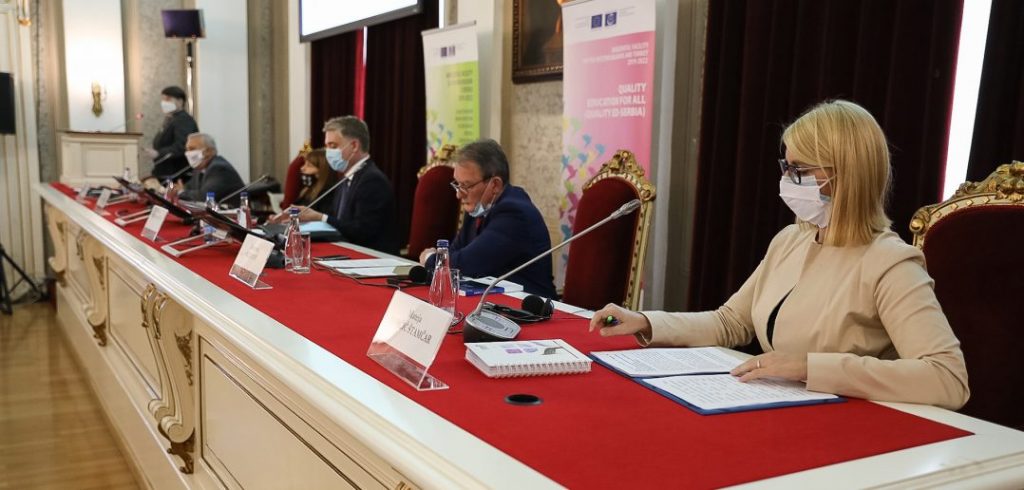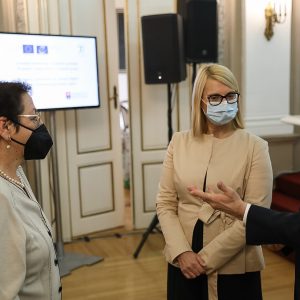Europe is celebrating 70th anniversary of the European Convention of Human Rights (ECHR), the crucial document on the continent protecting democracy, rule of law and human rights of more than 830 million people in Europe. Serbia joined the Council of Europe in 2003 and the European Convention in 2004, confirming its dedication to better protection of the rights of Serbian citizens.
On this occasion, the event “The European Convention on Human Rights – 70 years of advancing human rights” was organised by the Council of Europe, in co-operation with the European Union, in Belgrade. It brough together the Council of Europe main partners, representatives of Member States, international organisations, and national human rights institutions.
Ivanka Popović, Rector of the University of Belgrade welcomed guests on behalf of the University of Belgrade and its academic community. Head of the Council of Europe Office in Belgrade, Tobias Flessenkemper, highlighted that this event is one of the few events marking this important anniversary of the Convention that is taking place in person.

Deputy Head of the Delegation of the EU to Serbia, Mateja Norčič Štamcar, said on this occasion that the European Union founding principles are based on the respect of human rights and dignity. She added that the history has shown that it is not sufficient to proclaim the human rights, but that it is also necessary to fight to protect them. “This is why the EU insists on policies and practices in this field, putting chapter 23 among the first two topics of the EU accession process,” she said. “Precondition for the full exercise and proper protection of the rights is the existence of the efficient legal system, involving both legislative and institutional framework, efficient and impartial judiciary and independent bodies responsible for monitoring of the protection of human rights and fundamental freedoms,” Norčič Štamcar added, highlighting the support that the EU provides to the institutions and CSOs in Serbia in this regard.
Georgios Diakofotakis, Ambassador of Greece to Serbia on behalf of the Greek Chairmanship of the Committee of Ministers of the Council of Europe pointed out that the Athens declaration to be adopted today, will highlight the importance of the Convention in extraordinary circumstances. “Our vigilance in these times will be measured against our capacities to adapt to the new circumstances”, he concluded.
Justice Snežana Marković, President of the Constitutional Court reflected on the impact and outlook of the ECHR in Serbia. As she stated, the ECHR has been inspiring the creation and evolution of the constitutional guarantees in Europe, but also across the world. “Results and analysis are showing that the Constitutional Court of Serbia often refers to the ECHR and the judgements of the European Court of Human Rights”, she noted.
“The Convention is an important instrument in the hands of Serbian courts. It allows them to have access to the most advanced human rights protection system”, said Justice Dragomir Milojević, President of the Supreme Court of Cassation. “Judges have the responsibility in implementing the Convention”, he concluded.
„Human rights are not theoretical and illusionary, but practical“, said the keynote speaker, Professor Angelika Nußberger, Judge of the European Court of Human Rights elected in respect of Germany (2011-2019), the Court’s Vice-President (2017-2019), and a Member of the Venice Commission. She underlined the importance of the European Court of Human Rights and reiterated that the Court is often called „the counciousness of Europe“, thus that the European states are working together to consolidate work of the Court and move it forward.
The importance of active citizenship and youth in the context of the Convention were underlined by Emilija Gagrčin, Member of the Advisory Council on Youth of the Council of Europe. As she underlined, the programmes, such as the one on Quality education for all, supported by the EU and Council of Europe, are very much needed. They offer the opportunity to education systems to embrace the democratic culture and allow more young people to speak a common language of democracy and human rights, understand what political pluralism and participation mean and how to take part in decision-making processes.
The event was organised within the “Strengthening the effective legal remedies to human rights violations in Serbia” and “Quality Education for All” actions implemented under the European Union and Council of Europe’s joint “Horizontal Facility for the Western Balkans and Turkey 2019-2022”.



